
Beetles are insects that form the order Coleoptera, in the superorder Holometabola. Their front pair of wings are hardened into wing-cases, elytra, distinguishing them from most other insects. The Coleoptera, with about 400,000 described species, is the largest of all orders, constituting almost 40% of described insects and 25% of all known animal species; new species are discovered frequently, with estimates suggesting that there are between 0.9 and 2.1 million total species. Found in almost every habitat except the sea and the polar regions, they interact with their ecosystems in several ways: beetles often feed on plants and fungi, break down animal and plant debris, and eat other invertebrates. Some species are serious agricultural pests, such as the Colorado potato beetle, while others such as Coccinellidae eat aphids, scale insects, thrips, and other plant-sucking insects that damage crops.
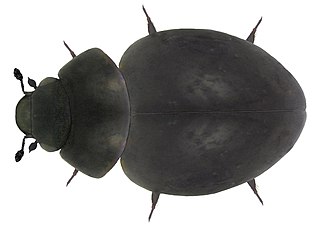
Sphaerius is a genus of beetles in the family Sphaeriusidae, comprising 18 species. It is one of the two extant genera in the family, the other being Bezesporum. They are typically found along the edges of streams and rivers, where they feed on algae; they occur on all continents except Antarctica. Three species occur in the United States.

The Asian long-horned beetle, also known as the starry sky, sky beetle, or ALB, is native to the Korean Peninsula, northern and southern China, and disputably in northern Japan. This species has now been accidentally introduced into the eastern United States, where it was first discovered in 1996, as well as Canada, and several countries in Europe, including Austria, France, Germany, Italy and UK.

The longhorn beetles (Cerambycidae), also known as long-horned or longicorns, are a large family of beetles, with over 35,000 species described.
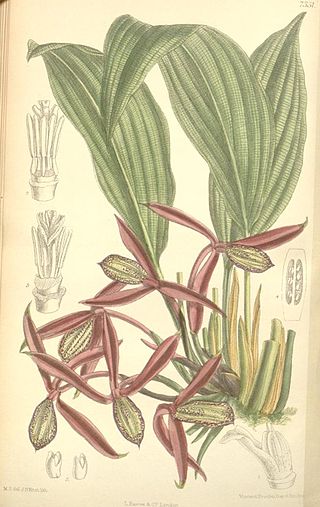
Orchidantha is a genus of flowering plants. In the APG III system, it is placed in the family Lowiaceae, as the sole genus. It includes the plants in the formerly recognised genera Lowia and Protamomum.

Dung beetles are beetles that feed on feces. Some species of dung beetles can bury dung 250 times their own mass in one night.

The citrus long-horned beetle is a long-horned beetle native to Japan, China, Korea, Taiwan and Southeast Asia where it is considered a serious pest. This beetle has invaded several countries in Europe, including Italy, Switzerland, Turkey, France, Germany, and Croatia.

Ulmus lanceifoliaRoxburgh, ex Wall., occasionally known as the Vietnam elm, is a very large tree endemic to a wide area of southern Asia. Its range extends southeast and eastwards from Darjeeling in the Himalaya, through Bangladesh, southern China, Myanmar, Thailand, Laos, Vietnam and on discontinuously into Indonesia, straddling the Equator in Sumatra and Celebes.

Ptiliidae is a family of very tiny beetles with a cosmopolitan distribution. They are colloquially called featherwing beetles, because the hindwings are narrow and feathery.

Rickett's big-footed bat is a species of vesper bat. It can be found in southern and eastern China, Vietnam, and Laos. This species has often been called Myotis ricketti, but the older M. pilosus has priority. The erroneous reporting of the type locality as being in Uruguay by Wilhelm Peters led to the dual naming.
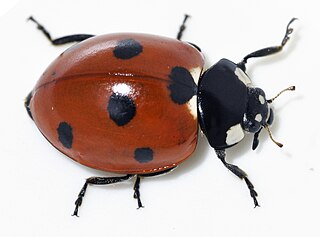
Coccinellidae is a widespread family of small beetles. They are commonly known as ladybugs in North America and ladybirds in the United Kingdom; "lady" refers to mother Mary. Entomologists use the names ladybird beetles or lady beetles to avoid confusion with true bugs. The more than 6,000 described species have a global distribution and are found in a variety of habitats. They are oval beetles with a domed back and flat underside. Many of the species have conspicuous aposematic (warning) colours and patterns, such as red with black spots, that warn potential predators that they taste bad.
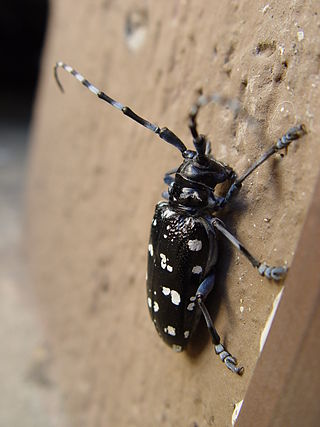
Anoplophora is a genus of beetles in the longhorn beetle family (Cerambycidae). They are native to Asia. Most are large and colorful and thus are depicted in artwork and sought after by beetle collectors. The genus also includes several notorious pest insects.

Ancyronyx, commonly known as spider water beetles or spider riffle beetles, is a genus of aquatic riffle beetles from North America, South Asia, China, and Southeast Asia. They are small beetles with extremely long legs ending in strong claws. Both the adults and the larvae are found underwater in the shallow riffles of streams and rivers, clinging to rocks or submerged wood. They feed on algae and decaying wood tissue. The genus contains twenty-one species, eleven of which are endemic to the Philippines.

Anoplophora horsfieldii is a species of beetles in the longhorn beetle family (Cerambycidae).
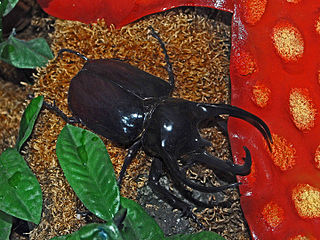
Chalcosoma chiron is a species of beetle in the family Scarabaeidae. This species can be found from Malaysia south into Indonesia and Thailand in East region. It was formerly known as Chalcosoma caucasus, a name which is a junior synonym and not valid.
Anoplophora quadrifasciata is a species of beetle in the family Cerambycidae. It was described by Stephan von Breuning in 1961.

Anoplophora elegans is a species of beetles in the longhorn beetle family (Cerambycidae). It was found by Gahan in the Mine District in Upper Burma (Myanmar). It is distributed in South East Asia.

Anoplophora medenbachii is a species of beetles in the family Cerambycidae. It is distributed in Southeast Asia.
Anoplophora imitator is a species of beetle in the family Cerambycidae. It is distributed in China.

Anoplophora zonator is a species of beetle in the family Cerambycidae. It is distributed in Borneo, Malaysia, Thailand, Laos, and Myanmar.


















